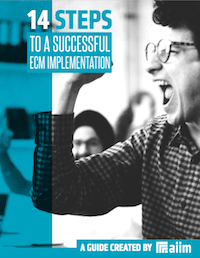The AIIM Blog
Keep your finger on the pulse of Intelligent Information Management with industry news, trends, and best practices.
Enterprise Content Management (ECM) | Sharepoint and Office 365
I recently received a review copy of a great new resource by two AIIM "veterans," Shad White and Chris Riley, called Enterprise Content Management with Microsoft SharePoint. If you are involved in a SharePoint implementation at your organization -- or if you are an SI in the SharePoint space -- you need this book.
Share
Intelligent Information Management (IIM)
Information (documents, emails, videos, podcasts, voicemails, texts, tweets, Facebook posts, LinkedIn conversations, customer analytics, etc.) surrounds us. We rely on this information for entertainment and to do our jobs. Access by employees to information and manipulation by companies of their customer information to serve customer needs is THE competitive advantage today. Better information equals better results. The problem? That information is everywhere and not always managed effectively. By managed we mean channeled towards some business outcome. We use the phrase “Information Chaos” to describe this ongoing and accelerating state of massive information disruption. Take back control and tame your Information Chaos with this round-up of the best free content on Intelligent Information Management. Enjoy! 1. Build an Effective Social Business Strategy in 8 Steps Can you share information without compromising security or control? All it takes is one rogue Twitter or Facebook post to deliver a significant blow to your brand image. While you can’t be cavalier about who says what in your organization’s name, neither can you lock down access to social media outlets. So what's the solution? Establish a social media policy to proactively guide your employees on leveraging social business while protecting your organization. DOWNLOAD
Share

Making an ECM implementation successful requires planning and attention to detail. The best way to create the right solution is to identify organizational goals and priorities. Learn how to manage a successful implementation in our free guide.
The emerging picture for big data analytics suggests that there is still a very high expectation for the potential value, and overall, early adopters are achieving good results that are helping to drive decision making in the business. But despite the fact that more trained practitioners have joined the ranks, there is still a skills shortage. Plus, the tools available are still considered hard to use and somewhat expensive. The overarching theme is that many organizations are too immature in their content management, search, and basic reporting to contemplate big content projects just yet, although they are making technology decisions today with a view to a big data future. AIIM's research study, "Big Data and Content Analytics -- Measuring the ROI," sought to find out more. Below, see the five key trends from the research project.
Share
Enterprise Content Management (ECM)
A video session from The AIIM Conference, Moving from Content Silos to True Enterprise Services: TD Bank's Formula for Success.
Share
Intelligent Information Management (IIM)
As many of you know, well-known futurist Thornton May (and a former AIIM Board Chair) is one of the keynote speakers at The AIIM Conference 2014 (April 1-4, in Orlando). Thornton is one of those keynote speakers you won’t forget – suffice it to say, he is not a shy person! I usually start my research for introductions at Conferences not by looking at all the boring CV/Resume data points about schools and jobs, but rather by looking at things a speaker has actually said and whether these things jar my conventional assumptions. With Thornton, there is no shortage of great quotes.
Share
Change Management | Information Governance
Follow along with this Slideshare presentation to learn how to sell Information Governance to executives. This presentation will help you establish an information accountability framework that reduces costs, manages risk, and optimizes value. You’ll learn how to: Get executive sponsorship Establish an Information Governance Program Identify necessary components, technologies, and instruments Assess the impact of mobile, social, cloud, and big data analytics Conduct a risk assessment and mitigation Automate records retention and disposition Identify necessary roles and responsibilities Measure for success *Presentation via Atle Skjekkeland. Feel free to use and reuse and repost and embed.
Share